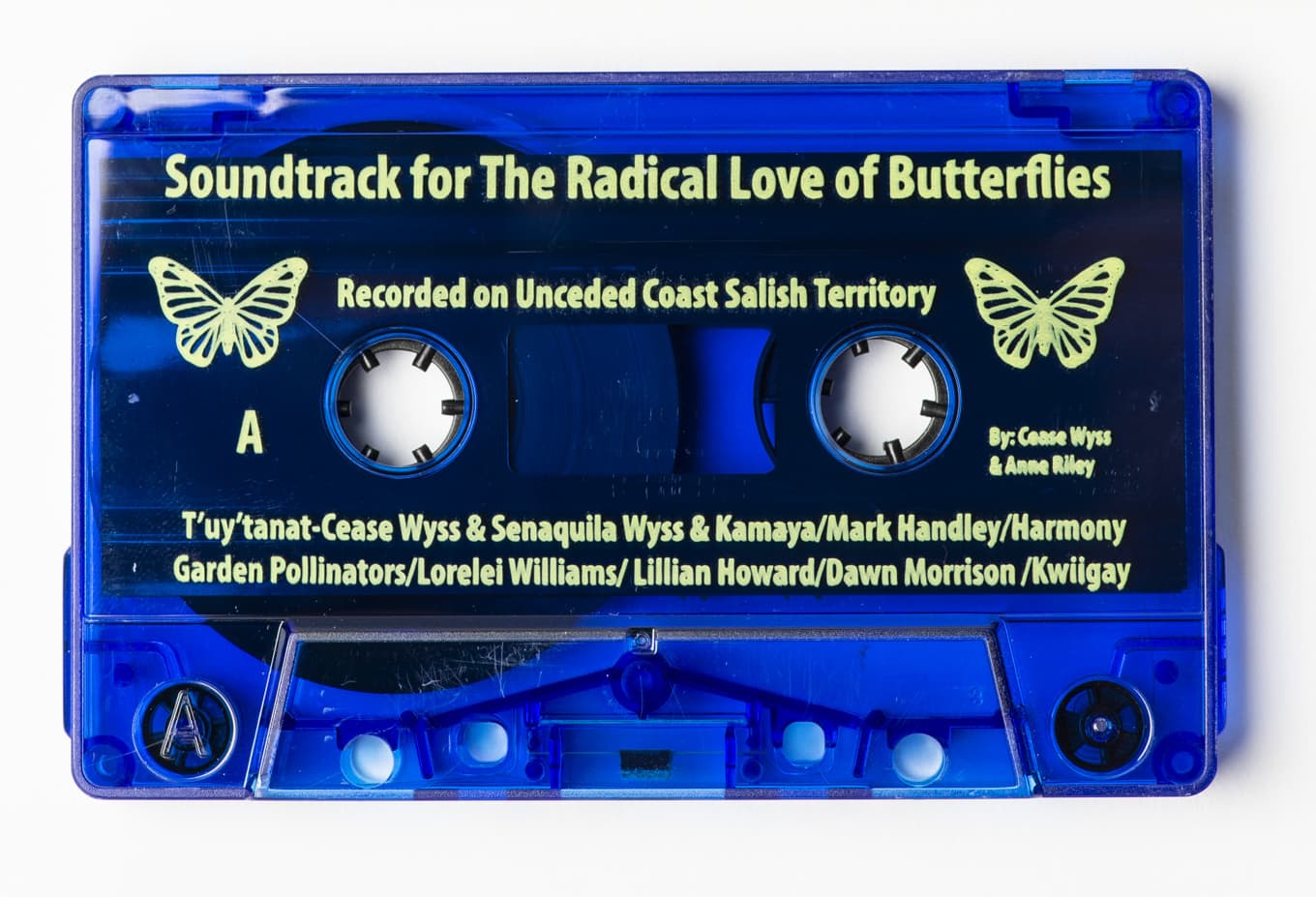
T'uy't'tanat-Cease Wyss and Anne Riley, Soundtrack for the Radical Love of Butterflies, 2018. Collection of Walter Phillips Gallery, Banff Centre for Arts and Creativity P18 0005 V
T’uy’t’tanat-Cease Wyss and Anne Riley, Soundtrack for the Radical Love of Butterflies, 2018
Sound work on cassette tape, Side A: 45 minutes; Side B: 38 minutes
Collection of Walter Phillips Gallery, Banff Centre for Arts and Creativity
P18 0005 V
Soundtrack for the Radical Love of Butterflies (2018) by T’uy’t’tanat-Cease Wyss (Skwxwu7mesh, Sto:lo, Hawaiian, Swiss) and Anne Riley (Slavey Dene, Fort Nelson First Nation) is an artwork in the form of a cassette tape first produced in an edition and gifted to those in attendance at the talk, a chrysalis of being by both artists that took place at Mike MacDonald’s Butterfly Garden (1999) at Banff Centre on August 4, 2018. The sound work was initially made by Wyss and Riley as their contribution to the exhibition, If the river ran upwards and was inspired by MacDonald’s Butterfly Garden and the remediative work of pollinators that can be considered a form of love.
On Side A of the cassette tape, the sounds of pollinators can be heard, giving voice to and honouring their work within Harmony Garden and larger ecosystem. Other recordings on the cassette tape are conversations with those whom Wyss and Riley understand as butterflies, each remediating the communities within which they live and work through their efforts. Side A includes interviews with the late Lillian Howard, a community matriarch in Vancouver; and Lorelei Williams, founder of "Butterflies in Spirit," a dance group aimed at the awareness of Missing and Murdered Indigenous Women and Girls. This side of Soundtrack for the Radical Love of Butterflies further features an interview with Mark Handley, who supported MacDonald in planting various Butterfly Gardens. Side B includes a recording of Dawn Morrison, Founder, Chair and Coordinator of the B.C. Food Systems Networking Group on Indigenous Food Sovereignty; and a love song lullaby sung by queer multidisciplinary artist Kwiigay iiwaans. The ethics of relationality core to Wyss and Riley’s practices across different forms of artmaking, living, working and being, is an invitation to think about not only what art can be, but how it can act as a remediative force within and outside of the walls of a gallery.
Soundtrack for the Radical Love of Butterflies can be reserved here for check out from the Front Desk at the Professional Development Centre at Banff Centre. You are invited to listen to the work in MacDonald’s Butterfly Garden adjacent to Glyde Hall, or elsewhere outdoors or indoors on campus.
T’uy’t’tanat Cease Wyss
T’uy’t’tanat Cease Wyss is an Indigenous Matriarch of the Skwxwu7mesh, Sto:lo and Hawaiian people. Through her work as an ethnobotanist, artist, activist and community-based educator, they strive to share Indigenous customs, teachings, and futures and to connect Indigenous peoples. Wyss’s thirty-year career encompasses a vast array of practices, from weaving, making remedies, medicine walks to the realm of Indigenous Digital Futurisms. Her interactive, community-based work is insightful and informative of their contemporary conditions.
Interweaving their skills as an ethnobotanist and an interdisciplinary artist, Wyss maintains a practice to decolonize their life and their art by learning about their culture and using traditions practiced by their ancestors. This is witnessed in their recent exploration of cultural weaving using materials traditionally used by Salish People such as red and yellow cedar, Salish Woolly dog fibre, stinging nettles, and fireweed fluff. Furthermore, their current community teachings and research is focused on restoring and remediating Indigenous species and natural space by encouraging others to build their Indigenous food forests and to nurture local biodiversity respectfully and sustainably.
Wyss is a collaborator, deeply involved in community building and finds dialogue with communities crucial in exchanging knowledge and critical in preserving Indigenous understanding of the land and ecosystems. Wyss has taught these teachings to public institutions and organizations and has participated in creative projects that share different indigenous cultures in stewarding this effort in preservation. Outside the importance of preserving what surrounds them, she believes in the importance of taking care of and feeding oneself, in redefining oneself as a way to care for Mother Earth, Chescha7 Timixw, and Ch’iaxw- their sacred protocol.
Anne Riley
Anne Riley is a Indigiqueer multidisciplinary artist living as a Slavey Dene/German guest on the unceded territories of the xʷməθkʷəy̍əm, Sḵwx̱wú7mesh and Sel̓íl̓witulh Nations. She is a member of Fort Nelson First Nation. Her work explores different ways of being and becoming, touch and Indigeneity. Riley received her BFA from the University of Texas at Austin and has exhibited across the United States and Canada. From 2018-2020 she worked on a public art project commissioned by the City of Vancouver with her collaborator, T’uy’t’tanat Cease Wyss. Riley and Wyss’s project, A Constellation of Remediation, consisted of Indigenous remediation gardens planted throughout the city. Riley and Wyss were long listed for the 2021 Sobey Art Award. Since this project, Riley participated in the Drift: Art and Dark Matter residency and exhibition, creating works that consider the possibilities of making and being beyond the confines of western institutions and extractive processes. Currently, they are an MA Candidate in Cultural Studies at Queen's University. Their thesis research is focused on Indigiqueer Feminist Dene love.